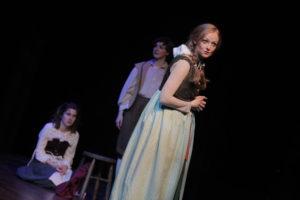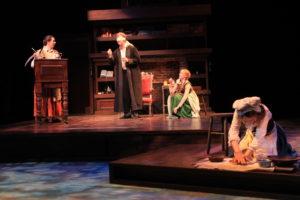
“You haven’t the flame to outlast a raindrop. You’re not a conflagration, Mary; you’re a wee match in the sea of time. And the sea will swallow you up,” John Milton boomed in response to his daughter’s plea to satiate her hunger for knowledge.
In the play’s world premiere at the Davis Performing Arts Center, the Gonda Theater’s production of L M Feldman’s “Amanuensis” invites its audience to tackle the complexities of the human experience by confronting the disparities between romanticized renderings and the truth.
Set in 17th-century England at the height of its social instability, “Amanuensis” spans the seven-year period when Milton, played by Alexander Prout (COL ’19), wrote the epic poem “Paradise Lost.”
The production investigates the relationship between a blind and incapacitated Milton and his three illiterate daughters, Deborah, played by Healy Knight (COL ’20); Mary, played by Kate Ginna (COL ’18); and Anne, played by Michaela Farrell (COL ’18), as they transcribe his epic. This exploration of the Miltons’ lives acts as a catalyst for a dialogue about inequity, opportunity, genius, gender, privilege, voice and loss.
Feldman’s impetus was to narrate a tender story about a father and daughter, until her research revealed otherwise: In his will, Milton called his daughters “unkind children … very undutiful to me,” revealing their turbulent and fraught relationship.
“It became more about the disparity between the romanticized renderings of things and the inequities of what was true,” Feldman said in an interview with The Hoya.
Feldman felt compelled to fill the aperture between imagination and reality, resulting in the creation of this “loosely historically inspired feminist fantasia,” professor Maya Roth, the director of “Amanuensis,” wrote on the Georgetown Events website.
The narrative of “Amanuensis” follows a multitude of tragedies in the Milton daughters’ lives, including the deaths of their mother Mary Powell and their two siblings. Prout’s performance exhibits an emotionless countenance truthful to Milton’s character, successfully portraying Milton’s apathy toward his family.

In the play, Milton derives zeal exclusively from his work and intellectual interactions with the male sex. “For Cromwell he cries. For his wife and daughter,” Mary despairingly murmurs, as it takes the death of Oliver Cromwell, the Lord Protector of the Commonwealth of England, to elicit any sort of emotion from Milton, a fervent supporter of the Commonwealth.
Rather than exhibit paradigmatic characteristics of a loving father, Milton instead berates his daughters over the simplest transgressions. In one of the most resonant lines of the play, when Mary fails to record the entirety of the morning’s work, Milton roars, “I cannot keep constellations in my head, and here I am: Horribly, pitifully, ironically, cruelly reliant on weak and weary hands to scribe the starts with which I am trying to build firmaments. O God the sublime injustice!”
Nevertheless, Milton’s cruelty is excused by some characters because of the allure of his genius. Thomas, played by Travis Fujita (MSB ’18), presents this viewpoint, passionately insisting that the anguish Milton inflicts on his daughters is worth it because of his ability to move mountains with words.
Despite the play’s esoteric allusions, direct inclusion of excerpts from “Paradise Lost” and focus on Milton’s unattainable genius, Feldman masterfully includes scenes of high theatricality, comedy and wit to make the play more accessible to the audience.
Through subtle hints of discombobulation, like the sisters’ furrowed brows, invisible to their father, and more explicit markers of confusion regarding Milton’s profound thoughts, like Mary’s muttered frustrations, the cast effectively contributes to this effort.
Through the marrying of heightened comedy and the evident chemistry between Knight, Ginna and Farrell, Milton’s daughters are finally given a voice to help the audience “gain insight into [the] Miltons’ inner world[s]” and communicate Feldman’s social critiques.
The play’s structure oscillates between a sequential progression of time and what Feldman calls “interstitial scenes” where every other scene advances the plot by a year. The interstitial scenes are marked by spotlights on the three girls and include additional costume props pulled from a hidden cabinet to differentiate the narrative. These scenes are placed out of time and contain the fantasies of the three daughters where they imagine scenes that range from their father’s childhood to these origin stories.

In the 11th scene, Ginna sarcastically recounts the insensitivity and male chauvinism characteristic of her father, reinforcing the gender inequity of the time. “Amanuensis” also acknowledges the loss that humankind has suffered from the exclusion of female voices through Farrell’s character, Anne, as she recreates the romanticized scenes through the imagination of prominent male painters like Joseph Fradelle, Eugene Delacroix and Soma Orlai Petrich. She reveals that these scenes “look like the past but they are not [her] memory,” and wonders, “Whose memory? Whose truth?”
Feldman poses these questions in a narrative structure to engage the audience while capturing the complexity of the issues.
“I hope that people leave thinking about who we aren’t hearing from, who are we giving the opportunities to, and if can we do better, what that would take,” Feldman said.
Contrasting the cruel realities of the sisters’ fates with an optimistic prophecy, Deborah’s final monologue echoes the aspirations of Milton in challenging the audience to create “a more just world.”
“Amanuensis” comprehensively embodies the Davis Performing Arts Center’s central focus on “Past/ Present” for its 2017 to 2018 season by wrestling with the historical complexities to engage the audience with contemporary socio-political issues and ignite a desire to invoke change.
“Amanuensis” runs in the Gonda Theater at 8 p.m. from April 19 to 21. Tickets are available at performingarts.georgetown.edu.



















